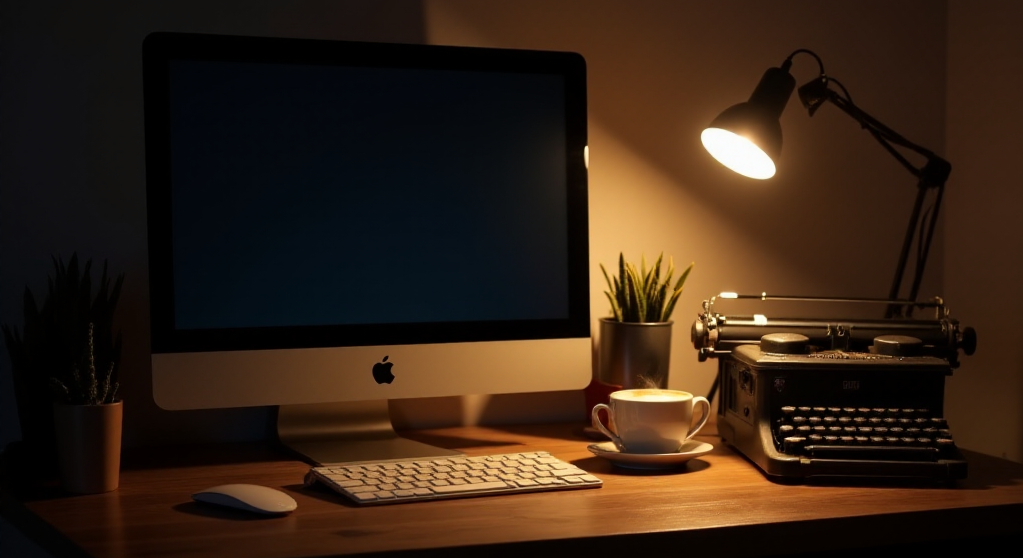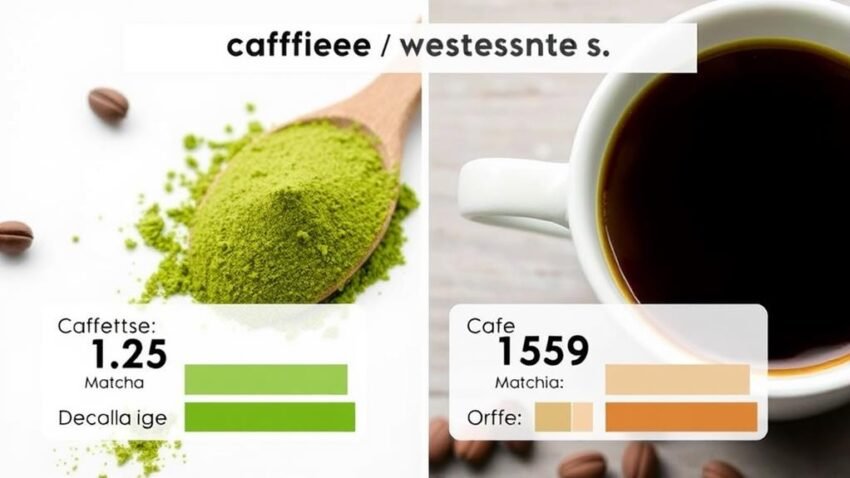When I'm looking for a boost of energy, I often find myself weighing the options between matcha and coffee. While both are popular choices, their caffeine content is quite different. Matcha typically contains about 70 milligrams of caffeine per cup, which is roughly a third of what you'd find in most cups of coffee. This disparity isn't just about numbers; it reflects distinct energy profiles. Matcha's caffeine is released gradually, offering sustained alertness, whereas coffee delivers a quicker but more intense energy spike. Curious about how these differences affect your daily routine? Let's explore this comparison further.
Caffeine Content Comparison
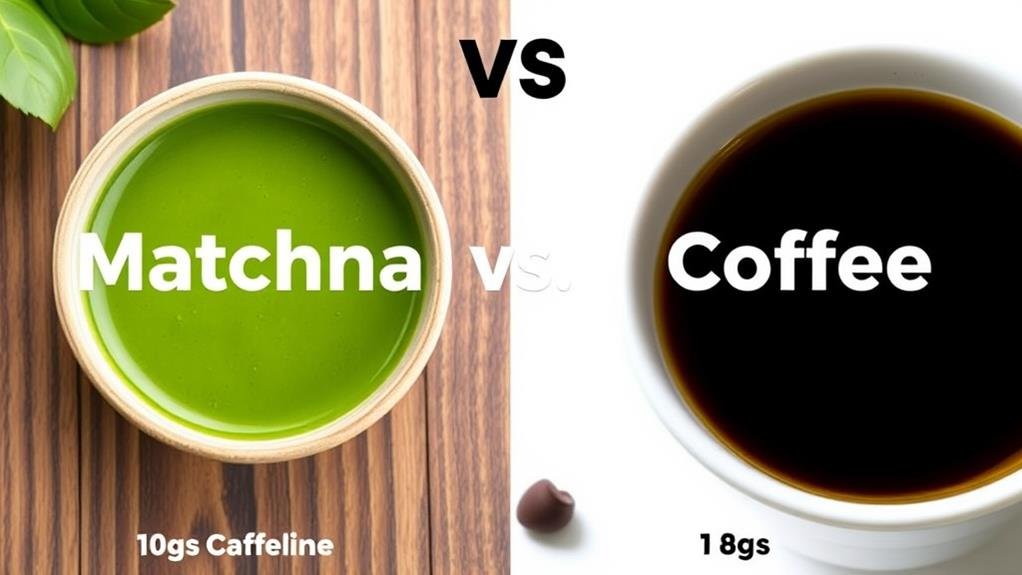
When it comes to caffeine content, there's a significant difference between matcha and coffee. A cup of matcha contains around 70 milligrams of caffeine, which is substantially less than what you'd find in a cup of coffee. Coffee typically has between 95 to 200 milligrams of caffeine per cup, making it a much more potent source of caffeine. This is similar to how Arabica coffee, known for its diverse flavor profiles, can also vary in caffeine content based on factors like growing conditions.
This difference means that matcha has approximately one-third the caffeine content of coffee, making it a milder option for those seeking an energy boost. The caffeine in matcha is also released slowly, providing sustained energy over a longer period. In contrast, the caffeine in coffee offers a quicker energy spike but may not last as long.
The caffeine content in both matcha and coffee can vary based on their concentration, so it's essential to take this into account when choosing between them. For someone looking for a moderate energy boost without the intense jolt that comes with coffee, matcha is often the preferred choice. This makes matcha vs coffee a clear comparison when it comes to managing your caffeine intake effectively.
Matcha's Unique Caffeine Profile
Matcha's unique caffeine profile sets it apart from coffee in several key ways. When you drink matcha, you're not just getting a shot of caffeine; you're experiencing a balanced blend of energy and focus.
Here are three key aspects of matcha's unique profile:
- Gradual Caffeine Release: Unlike coffee, where caffeine hits your system quickly and can lead to spikes and crashes, matcha releases its caffeine gradually. This means you get a sustained energy boost without the jitters or crash later on.
- Combination with L-theanine: Matcha contains the amino acid L-theanine, which slows down the absorption of caffeine. This combination promotes a calm yet focused state of mind, making it easier to stay alert and productive over a longer period.
- Lower Caffeine Content: Matcha has a lower caffeine content compared to coffee, with approximately 70 milligrams per cup. This makes it an excellent option for those who are sensitive to caffeine but still want to enjoy some energizing benefits.
These factors combined make matcha an ideal choice for those seeking a gentle, sustained energy boost without the harsh effects often associated with coffee.
Coffee's Caffeine Impact
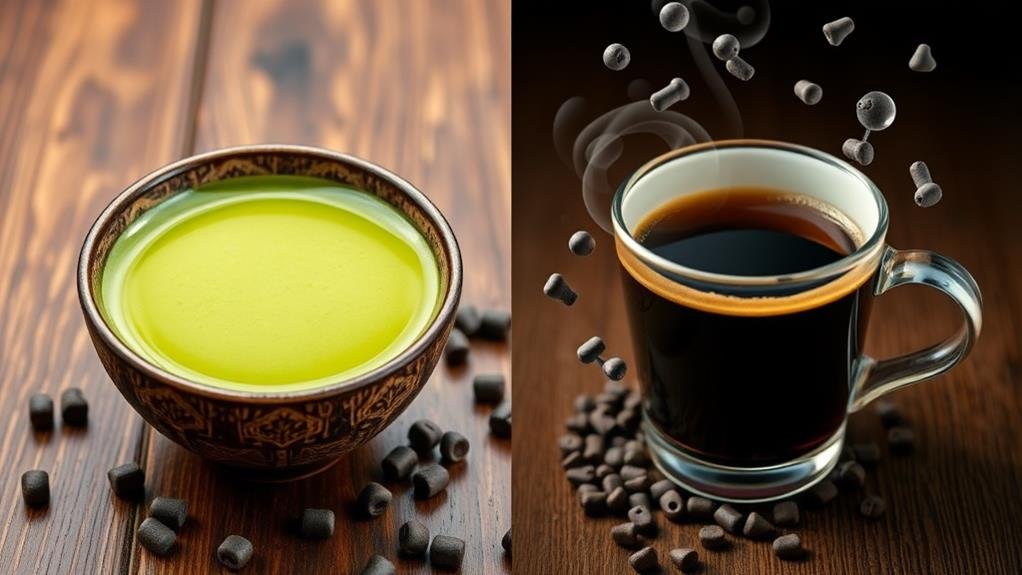
Coffee's caffeine impact is starkly different from matcha's, offering a more intense but fleeting energy boost. When you consume coffee, the caffeine absorption is rapid, which can lead to an adrenaline rush and a quick spike in your energy levels. This is particularly relevant for those sensitive to caffeine, as decaf coffee contains around 2 mg of caffeine per cup, making it a safer alternative for such individuals. However, this sudden increase often results in a potential crash once the effects wear off.
The high caffeine content in coffee beverages can elevate your heart rate and stress levels, especially if consumed excessively. This intense energy release may also interfere with your sleep patterns, leading to insomnia and anxiety if you drink too much coffee late in the day. Additionally, the caffeine in coffee can create a dependence, potentially causing unwanted side effects like increased heart rate and insomnia. For those seeking a smoother flavor experience, exploring methods like the Swiss Water Process for decaf options can be beneficial.
When comparing the caffeine in matcha vs coffee, it's clear that coffee provides a more immediate but shorter-lived effect. This makes it less sustainable for long-term energy needs compared to matcha's more balanced and prolonged energy profile. Understanding these differences can help you choose which beverage best suits your lifestyle and preferences regarding caffeine intake and energy levels.
Matcha's Sustained Energy
Matcha stands out for its unique ability to provide a sustained energy boost that lasts up to 4 hours without the crash often linked with coffee. This is mainly due to the combination of caffeine and L-theanine, an amino acid found in matcha.
Here are three key reasons why matcha offers sustained alertness:
- Energy Boost Without Crash: Matcha's energy boost is designed to last longer without causing the immediate decline in energy levels you might encounter with coffee.
- L-theanine's Role: The L-theanine in matcha promotes calmness and focus, enhancing the overall energy experience by regulating caffeine absorption in the body.
- Steady Energy Levels: Unlike coffee, matcha provides a consistent energy level that doesn't necessitate multiple cups to maintain alertness.
The caffeine boost from matcha lasts longer than coffee due to this regulated absorption, contributing to sustained alertness. This makes matcha an excellent choice for those who need continuous energy throughout their day without experiencing the jitters or crashes associated with other caffeinated beverages. By combining caffeine with L-theanine, matcha ensures that your energy levels remain stable and supportive over an extended period.
Coffee's Quick Energy Spike
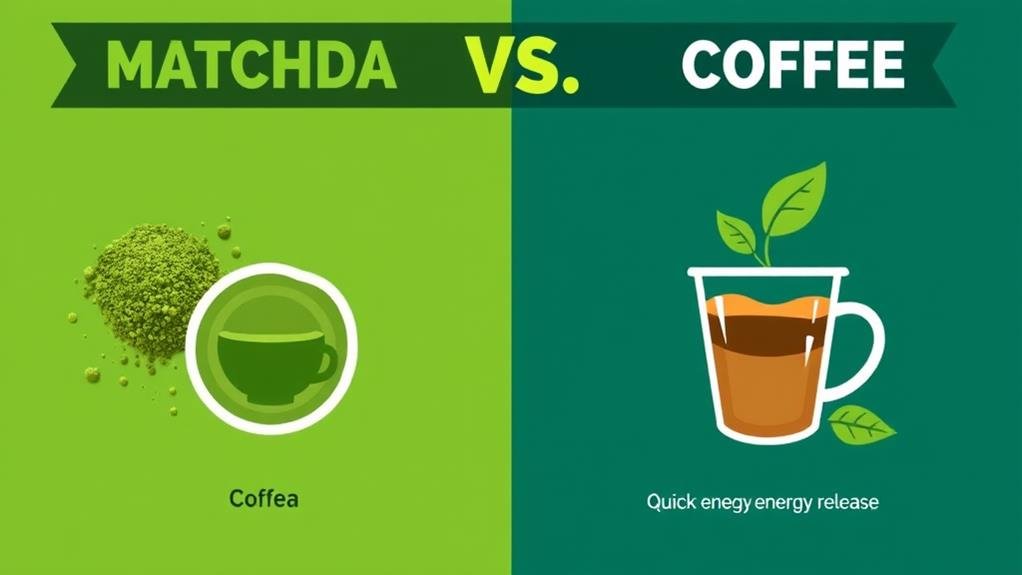
When I drink coffee, I experience an immediate energy boost due to the rapid absorption of caffeine. This quick absorption triggers an adrenaline rush and a spike in glucose and insulin levels, which can make me feel more alert but also jittery. Unlike matcha, coffee's fast energy release often leads to a crash in energy levels after the initial spike.
Immediate Energy Boost
If you're searching for a swift and intense energy boost, nothing beats the sudden jolt you get from a cup of coffee. This instant energy surge is mainly due to the rapid absorption of caffeine in coffee. Here are some key points to keep in mind:
- Caffeine Content: An 8-ounce cup of coffee typically contains between 95-200 milligrams of caffeine, which is notably higher than what you'd find in matcha.
- Rapid Absorption: The caffeine in coffee is absorbed quickly into your bloodstream, leading to a sudden release of adrenaline, glucose, and insulin.
- Energy Spike: This quick release results in an immediate energy spike that can be quite potent.
However, this rapid energy boost comes with some downsides. The energy spike from coffee can sometimes lead to jitteriness or a crash once the effects wear off. Unlike matcha, which may offer sustained alertness, coffee's fast-acting caffeine properties can result in fluctuations in energy levels throughout the day. For those seeking an immediate and intense energy boost, coffee's fast-acting caffeine properties make it the preferred choice over matcha. But if you're aiming for more stable and sustained alertness, matcha might be worth noting.
Adrenaline and Glucose Spike
Consuming a cup of coffee triggers a swift adrenaline, glucose, and insulin spike due to its rapid caffeine absorption. This quick energy boost is a direct result of how quickly caffeine from coffee enters your bloodstream. The sudden influx of caffeine can cause an adrenaline surge, which makes you feel more alert and energized almost immediately.
Alongside the adrenaline rush, coffee's rapid caffeine absorption also leads to a glucose surge. This rise in blood sugar levels is followed by an insulin response, as your body tries to regulate the sudden increase in glucose. Together, these changes contribute to the energy surge many people experience after drinking coffee.
However, this rapid energy spike can be short-lived. After the initial boost, you might feel a crash or experience restlessness. These effects are partly because the body's blood sugar levels and heart rate were significantly altered by the caffeine. Unlike matcha, which provides a more sustained energy release due to its slower caffeine absorption rate, coffee's immediate effects are more intense but shorter-lived. Understanding these differences can help you choose the right beverage based on your needs for energy and focus.
L-Theanine's Role in Matcha
L-theanine, a crucial amino acid found in matcha, plays a significant role in promoting relaxation and focus. Unlike coffee, which can cause a swift spike in caffeine levels, matcha's unique composition includes L-theanine to balance out its effects.
Here are three key ways L-theanine impacts your experience with matcha:
- Slows Down Caffeine Absorption: L-theanine helps to decelerate the absorption of caffeine, preventing an immediate adrenaline rush and subsequent crash.
- Enhances Calming Effects: The shading process during matcha cultivation increases L-theanine levels, enhancing its calming effects and promoting a more serene state.
- Sustains Energy Levels: The combination of L-theanine and caffeine in matcha provides sustained energy levels without the jitters associated with coffee, ensuring a balanced and alert state of mind.
This balanced interaction between L-theanine and caffeine means that when you drink matcha, you're more likely to experience stable energy levels without the acute highs and lows that come with coffee consumption. This makes matcha an excellent choice for those looking for a focus-enhancing beverage that also supports overall mental wellness.
Daily Caffeine Limits
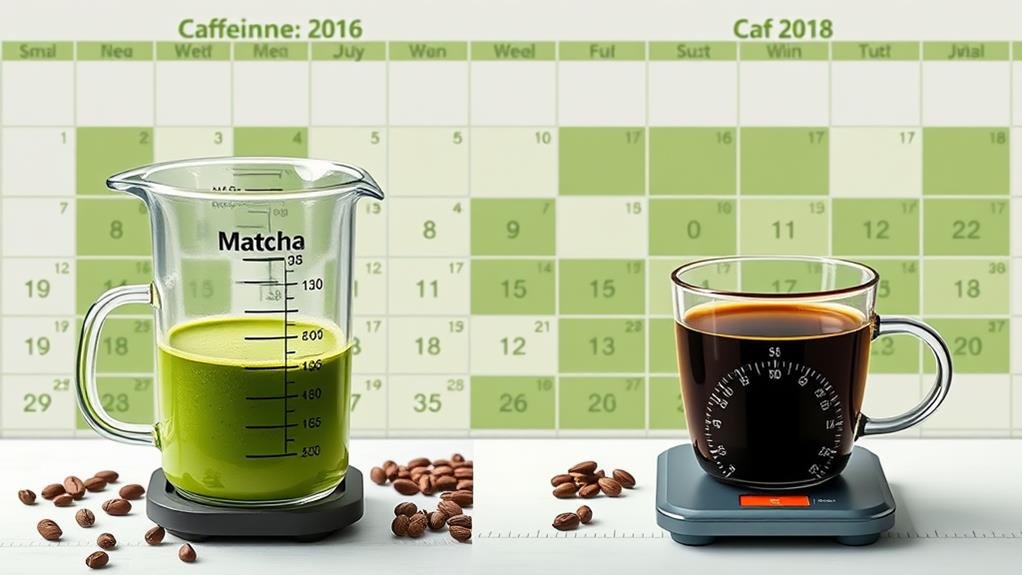
When considering the benefits of matcha and coffee, monitoring your daily caffeine intake is crucial. The suggested daily cap for adults is 400 milligrams of caffeine. For matcha, this equates to up to 5 cups, but I prefer to restrict myself to 3 cups to comfortably stay within this limit.
Careful consideration is also necessary for coffee consumption. Depending on the strength, 2-4 cups should be sufficient without surpassing the recommended caffeine intake. However, it's vital to note that individual tolerance and sensitivity play a significant role. Some individuals may experience adverse effects even at lower doses, so adjusting your matcha or coffee consumption based on how your body reacts is imperative.
Individuals with sensitivity may need to consume less than the suggested amount to avoid jitters, anxiety, or other negative side effects. By being mindful of these daily limits and adjusting accordingly, you can enjoy both matcha and coffee while upholding excellent health. This personalized approach guarantees that you can enjoy the advantages of these beverages without exceeding your caffeine boundaries.
Caffeine Absorption Differences
One key difference between matcha and coffee lies in how their caffeine is absorbed by the body. This distinction impacts how you experience energy over time.
When you drink coffee, the caffeine is absorbed rapidly, causing a quick spike in energy levels. This can be followed by a potential crash once the caffeine wears off. Here are three key points about caffeine absorption differences between matcha and coffee:
- Slow and Steady Energy Release: Matcha's unique combination of caffeine and L-theanine leads to a slower absorption rate. This results in sustained energy without sudden drops.
- Balanced Energy: The presence of L-theanine in matcha slows down caffeine absorption, providing a more gradual and even energy release.
- Avoiding the Energy Rollercoaster: Unlike coffee consumption, which can lead to an energy rollercoaster due to abrupt caffeine spikes and drops, matcha's gradual absorption helps maintain a stable energy level.
The combination of caffeine and L-theanine in matcha promotes a state of calm alertness, unlike the jittery effects sometimes experienced with coffee. This makes matcha a better choice for those seeking sustained energy without the usual peaks and valleys associated with coffee consumption.
Health Benefits of Matcha
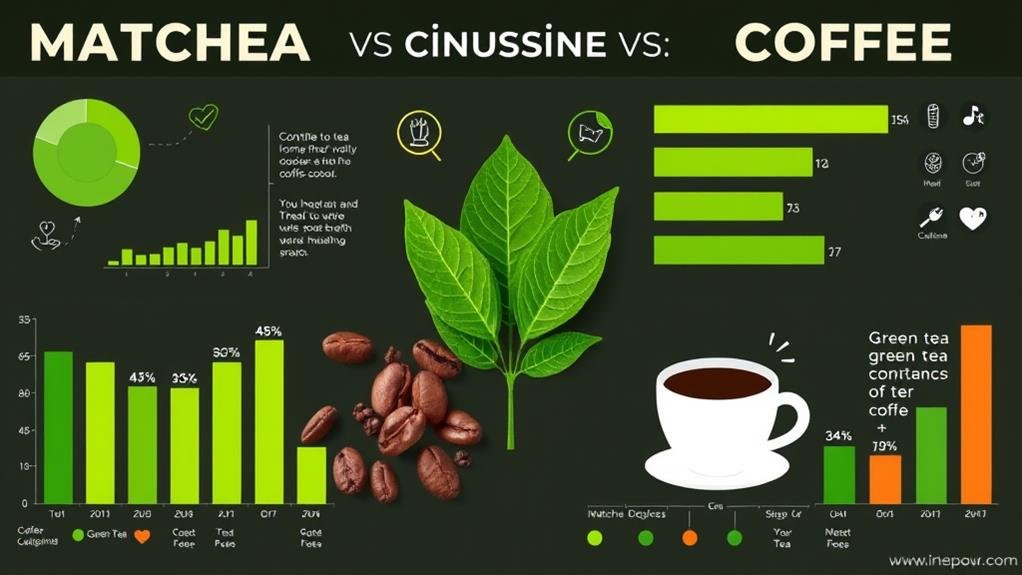
When it comes to the health benefits of matcha, I find it impressive that it is incredibly rich in antioxidants, particularly catechins like EGCG, which can help reduce inflammation and improve heart health. The amino acid L-theanine in matcha also stands out for its ability to promote relaxation and reduce stress without causing drowsiness. Additionally, matcha's sustained energy levels, thanks to its balanced caffeine and nutrient profile, make it a valuable addition to a healthy lifestyle.
Antioxidant Richness
As I explore the health benefits of matcha, it's clear that its antioxidant richness stands out as a significant advantage. Matcha is particularly rich in antioxidants, especially catechins like EGCG, which play an essential role in fighting inflammation and protecting cells from damage.
Here are some key ways matcha's antioxidants benefit our health:
- Heart Health: The antioxidants in matcha promote heart health by reducing inflammation and improving overall cardiovascular function.
- Brain Function and Cancer Risk: These antioxidants may also enhance brain function and reduce the risk of certain cancers.
- Metabolism and Weight Loss: Additionally, they can boost metabolism, aid in weight loss, and support immune function.
Compared to coffee, matcha offers a higher concentration of antioxidants, making it a healthier choice for long-term well-being. This potent antioxidant profile is one reason why regular consumption of matcha can provide a range of health benefits. By incorporating matcha into your diet, you can harness these powerful antioxidants to improve your overall health and well-being.
Stress Reduction Benefits
Matcha stands out for its unique ability to reduce stress levels, thanks to its rich content of L-theanine, an amino acid that promotes relaxation. Unlike coffee, which can sometimes exacerbate stress due to its high caffeine content, matcha offers a balanced blend of caffeine and L-theanine. This combination is key to understanding why matcha can help you feel calm and alert simultaneously.
When I drink matcha, I notice that the L-theanine helps increase alpha waves in my brain, inducing a state of relaxation without drowsiness. This is particularly beneficial because it allows me to maintain alertness while feeling more at ease. Regular consumption of matcha can notably lower stress levels and improve overall mental well-being.
In contrast, coffee primarily contains caffeine, which can lead to increased heart rate and anxiety in some individuals. While coffee may provide a temporary energy boost, it lacks the stress reduction benefits associated with L-theanine found in matcha. For those seeking a beverage that promotes mental clarity and calmness without the jittery side effects, matcha is an excellent choice. Its unique blend of caffeine and L-theanine makes it an ideal option for anyone looking to enhance their mental health while staying alert and focused.
Sustained Energy Levels
Caffeine and L-theanine in matcha work together to provide sustained energy levels, a significant health benefit that sets it apart from coffee. Unlike coffee, which can cause energy spikes followed by crashes, matcha offers a more stable and prolonged period of alertness.
Here are three key reasons why matcha stands out for its sustained energy benefits:
- Gradual Release: The combination of caffeine and L-theanine in matcha controls caffeine absorption in the body, leading to a gradual release of energy. This means you don't experience sudden jolts or immediate drops in energy levels.
- Enhanced Focus and Calmness: L-theanine promotes calmness and focus, enhancing the energy-boosting effects of caffeine. This blend helps maintain a balanced state of mind, allowing you to stay focused without feeling jittery.
- Longer-Lasting Energy: Matcha's caffeine boost lasts longer than coffee's, providing up to four hours of sustained energy without the need for multiple cups.
In contrast to coffee, which can lead to energy level drops and the need for frequent consumption, matcha sustains your energy levels consistently without immediate spikes. This makes matcha an ideal choice for those seeking a more stable and enduring energy boost throughout their day.
Matcha Vs Coffee: Energy Effects
When it comes to seeking a boost of energy, many turn to either matcha or coffee. While both provide caffeine, the way they deliver their energy effects is quite different.
Matcha offers a sustained energy boost that lasts up to four hours without the crash that often follows coffee consumption. This is mainly due to the amino acid L-theanine found in matcha. L-theanine promotes calmness and focus while balancing out the stimulation from caffeine, leading to a more balanced energy release. Unlike coffee, which can cause immediate spikes and subsequent drops in energy levels, matcha's caffeine boost is longer-lasting and smoother.
Coffee, on the other hand, may require multiple cups throughout the day to maintain energy levels. Each cup can cause a rapid increase in caffeine followed by a sharp decline, resulting in frequent energy level drops. In contrast, matcha's single serving provides a consistent and enduring energy boost without these peaks and troughs. This makes matcha an appealing choice for those seeking sustained energy without the rollercoaster effect of coffee's immediate spikes. The combination of L-theanine and caffeine in matcha makes sure that you stay focused and energized for hours without needing additional servings.
Conclusion
To sum up, matcha and coffee have distinct caffeine profiles. Matcha provides a milder, sustained energy boost due to its lower caffeine content and the calming effect of L-theanine. Coffee, on the other hand, offers a quicker energy spike but with higher caffeine levels. As the adage goes, "a little goes a long way"; understanding these differences can help you choose which one suits your needs for a balanced energy boost. Always consider daily caffeine limits to maintain overall health.
